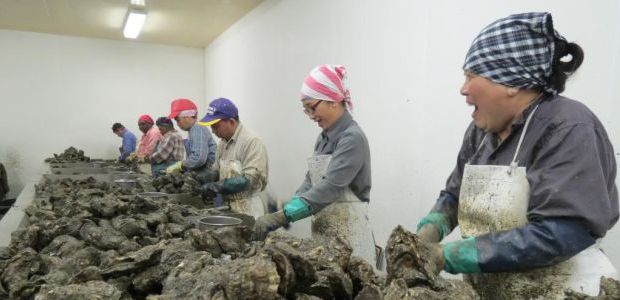
TPD discovers 27 animals in trailer
June 4, 2013Golf cart death suit alleges underage drinking
June 4, 2013The Louisiana Seafood Promotion and Marketing Board, which for 30 years operated as a quasi-independent entity, moved a step closer to mandated supervision by the Office of Lieutenant Governor Monday.
A bill authorizing the change, authored by state Sen. Norby Chabert, R-Houma, passed the House 64-27 following a floor debate. Rep. Joe Harrison, R-Napoleonville, took up Chabert’s standard, fending off questions and doubts from a handful of his fellows.
The measure now returns to the Senate for a final vote before the session’s end tomorrow.
While some in the local seafood industry will welcome the expected change, others have expressed skepticism, if not downright hostility.
Chabert maintains that his bill will move the board into a new era. Complaints that it will make unneeded change, he said, are groundless.
“As the board exists today under Wildlife and Fisheries, the way they operate, we didn’t change any of that,” Chabert said in an interview after the bill’s passage through the House. “We haven’t changed a thing. They are appointed the same way; they have the powers they had yesterday. It allows them to hire their executive director. Right now the board has to recommend three names and the department head selects the executive director. Now we put them in line with the rest of the state’s boards. I have consistently sought out the ability of the board to have the powers they had before.”
Chabert said his bill also gives greater autonomy and financial tools to the state’s seafood task forces, groups made up of fishermen, processors and dock owners in specific fisheries.
“We have fishermen, representatives of Wildlife and Fisheries on those task forces, which is who we need doing that, not some dude who makes TV commercials,” he said.
Under the direction of the Office of Lieutenant Governor, he has said, the board will receive better direction. The Office of Culture, Recreation and Tourism, which Lt. Gov. Jay Dardenne supervises, already does a good job of marketing Louisiana, Chabert has reasoned. It makes sense, he said, that the office will do a good job of marketing Louisiana seafood.
Management at one of Terrebonne Parish’s largest shrimp processing plants, HiSeas of Dulac, manager Lance Authement in particular, has been cited by legislators as strong proponents of the Chabert bill.
Larger processors over the years have questioned some of the board’s plans of action; some have maintained that it does not meet the needs of their long-standing business models.
Some in the processing end of the industry, who did not wish to be identified, said they were distressed by some of the programs the board put together in the past. The BP money was spent on projects that in some cases fell through, like a promotion partnership with the New Orleans Saints, or otherwise ran into problems.
Board members who served at that time said they were under pressure from the Department of Wildlife and Fisheries to cement a deal with the Saints, though that has never been independently confirmed. In e-mails and other correspondence, however, Director Ewell Smith appeared to have been calling attention to the shortcomings of the deal.
The Chabert bill took a circuitous route to passage, waiting in the wings while a similar measure authored by Sen. Gerald Long, R-Winnfield, drew heavy fire because it also relegated the board to an advisory body, under the direction of the Secretary of Wildlife and Fisheries. Some fishermen and dock owners accused Long – and his House partner on the bill, Rep. Gordon Dove, R-Houma – as aiding Wildlife and Fisheries in a “money grab” because control of the board means control of millions of dollars gifted by petroleum giant BP as part of its voluntary efforts to repair damage done to the industry by its 2010 Deepwater Horizon oil spill.
One of the board’s longstanding members, Chef John Folse, now its chair, questioned aspects of the Chabert bill in a letter sent to seafood industry members. Folse – respected throughout Louisiana as an iconic master of Louisiana’s cuisines – raised questions but supplied no answers. Copies of his letter were circulated to House members.
“Who does the board direct now? Can the lieutenant governor independently spend the seafood board’s funds or remaining $16 million of the BP dollars?” Folse asked in the letter, which urged recipients to ask the same questions of their legislators. “The lieutenant governor appoints all future seafood board seats per the amended bill … This is your money. How does the seafood industry have oversight over a department and lieutenant governor that appoints the seafood board members? Does the seafood industry lose control over directing its own funds?”
Folse, in the letter as well as in his testimony before the Senate Natural Resources Committee last week, sidestepped outright criticism of the bill.
Criticism of the Seafood and Promotion Board’s former chairman, New Orleans seafood dealer Harlon Pearce, was presented going back two years by some of its members, primarily Cocodrie vessel and dock owner Kimberly Chauvin and Dulac dock owner Andy Gibson.
Gibson has not returned calls about his concerns. Chauvin has been outspoken, but said Monday her criticisms were limited to Pearce, who, like Chauvin herself, no longer serves.
She composed her own letter Monday – copies of which were also sent to representatives – questioning the wisdom of the Chabert bill.
The board’s newest member, Sarah Voisin, who with her family owns Motivatit Seafood in Houma, described passage of the bill as “sad.”
She took particular issue with Harrison’s criticism of the board in floor speeches during which he alleged that over the past 30 years of its existence Louisiana seafood sales have declined, losing market share to imports
“I am sad for Louisiana,” she said. “I can only hope that Sen. Chabert’s vision of what it is supposed to be is right. They have never given me specific reasons why the board didn’t do a good job. I think you can ask any other seafood promotion board in the U.S. and they will tell you that ours is one of the top two.”
Voisin expressed concerns that Chabert and other lawmakers have “been insensitive to the hard work, the sacrifice.” referencing her late husband, Mike Voisin, one of the board’s founders.
“That is so not true,” she said of allegations that the board has not done the best it could over decades. “They have done a wonderful job. Louisiana has never had so much recognition.”
Voisin later posted on her Facebook page “I personally know how much hard work and the many nights my husband spent promoting and marketing Louisiana seafood. Our recognition in the U.S. improved 100 fold in the past 30 years. With the board so splintered now we will need guidance to this vision none of us can yet see as better. It is one thing to find a better idea and go with it, but it’s quite another to lift yourself up by stepping on someone else. I hope Sen. Chabert shows us a better way. We will need his guidance to do something that has no proven track record for success. I will be watching and hoping for a greater future for LA SEAFOOD in good times and in crisis.”
Kimberly Chauvin said that while she, Gibson and others had complained about Pearce, as well as what those dissenting board members saw as too much tolerance for his sometimes controversial methods by Executive Director Ewell Smith, there was not a desire on her part to throw the shrimp out with the scupper water. “We expressed and were specific about the two things that we would have liked to see done at that particular time,” Chauvin’s letter states. “But to our shock, nothing was done to deal with the situation aside from (a) bill that screwed up the representation on the seafood board. Now I see this bill that came up in the 11th hour and more so that our season is open and it is just as important that our industry be out on the water. There is no time for us to be in Baton Rouge sadly enough to fight this bill off. And believe me when I say, industry does not want this bill. It seems no one is really listening to this industry, but there are some willing to push forward an agenda which we do not understand … This bill is a house of cards ready to be blown away at the first sign of a hurricane if this bill passes forth. We, my family and I, implore you not to allow this to happen.”
Some in the industry have made clear they are supportive, however, especially large-scale seafood processors who have complained in the past about the Board’s track record, though not publicly.
How much of a difference changes in the Board will make to fishermen working out on the water, should the bill receive its expected final passage, remains to be seen.
If consumer demand can be increased – as always – then fishermen might enjoy better dockside prices. Better promotion would mean greater demand for processors as well, from their clientele. But that has always been the case.
What is different this year from others is the huge sum of money available because of the BP oil spill debacle.
The money, Chabert and supporters of his bill maintain, makes the stakes higher than ever. Critics of the Chabert bill say control over that money is the reason interest exists in oversight of a Board that has never generated quite this much interest before.
Members of some fishing families who don’t approve of the changes Chabert’s bill creates have complained that he is out of touch with their concerns and desires.
Chabert has taken such criticisms personally, pointing to the involvement of his own family over the years in the commercial fishing industry.
“To say that I would do something, anything, that I would allow something to harm commercial fishermen here is an insult,” he said. “And it is an outright lie.”
Workers process the catch at Wilson’s Oysters in Houma.













